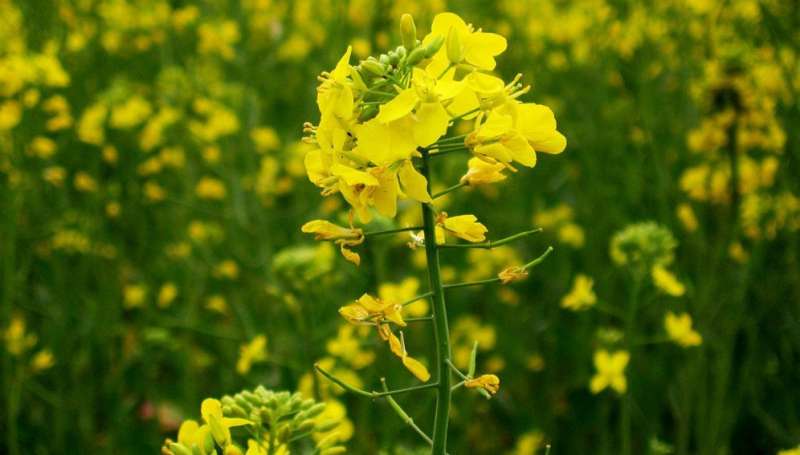India’s Supreme Court is set to rule on the commercialization of GM mustard. Credit: Amit Kaushal (https://commons.wikimedia.org/wiki/File:Mustard_plant.jpg). CC BY-SA 2.0 (https://creativecommons.org/licenses/by-sa/2.0/deed.en)
Whether India, the world’s second-largest producer of staples such as rice, wheat, fruits and vegetables, will eventually switch to genetically modified (GM) food crops is currently at its peak to stop the commercial release of GM. It is subject to a lawsuit being contested in court. mustard.
So far, India has limited its genetic engineering technology to cotton, a non-food crop. Attempts to introduce his GM variety of eggplant were thwarted in 2010. This followed negative feedback from nationwide public consultations with farmers’ groups and stakeholders held by then-Environment Minister Jairam Ramesh.
Now, 12 years later, the regulatory body, the Genetic Engineering Assessment Committee (GEAC), has approved the release of GM mustard into the environment, sparking a storm of outcry from scientists, doctors, environmental activists, legislators and litigators. Protesters claim GEAC approval was based on inadequate testing for public health and environmental impact.
On 23 December, the government issued a statement in support of GM technology, emphasizing the need for increased yields and disregarding the views and opinions expressed on the subject by unauthorized persons or former staff members of the Indian Agricultural Research Council. I warned you about the administrative proceedings against the article. It differs from decisions made by stipulated documents and regulatory authorities that have not been approved by the Council.
Earlier, a large petition by medical experts claimed that genetically modified mustard was genetically engineered to be resistant to glufosinate and therefore harmful to the environment.
Herbicide tolerance genes allow GM crops to survive spraying with herbicides designed to kill weeds, but ultimately destroy other plants, including food and fodder, leaving crops GM mustard contains genetic modifications with Bar, Barnase, and Barstar genes derived from two strains.
GEAC’s approval supersedes previous recommendations of three high-level expert panels that warned against the use of herbicide-tolerant crops in Indian conditions. These were the 2013 report of a panel of technical experts appointed by the Supreme Court and reports by two congressional committees filed in 2014 and 2017.
For example, in 2017 a congressional committee stated, “Given our country’s geography and its diversity, it is imperative that government agencies conduct research into indigenous peoples to substantiate their claims that no threat exists. It is a well-considered view that GM crops are having an impact on our environment. ”
The committee said it “understood that GM crops affect unintended organisms, including beneficial organisms such as bees and butterflies,” and that the impacts were “due to genetic engineering processes and the consequent use of pesticides and herbicides.” It is related to both agricultural practices related to On GM crops and GM seeds. ”
On the issue of gene transfer to non-GM crops, the committee said cross-pollination and contamination of non-GM crops could destroy traditional, organic crops, stating that “the Ministry of Agriculture, Forestry and Fisheries Admitted use: Resistance genes may escape via pollen to nearby farms and fields, other GM or non-GM cultivars, or wild weed relatives.
After questions were raised in parliament about the new approval, Minister of State for Science Jitendra Singh said in a written response on 8 December that the extensive research conducted between field trials and environmental safety studies had ” It provided evidence that GM mustard is genetically modified mustard.” The line was safe for cultivation and food and feed use. ”
Singh said the use of the ‘Bar’ gene, which is responsible for conferring herbicide tolerance on GM mustard, was approved by GEAC only to maintain genetic purity during hybrid seed production and is not commercially viable by farmers. He replied that it was not intended for cultivation.
“GEAC’s role is limited to evaluation, not approval, so the first question should be about GEAC’s ability to approve GM crops. Grants from the FAO International Convention on the Plant Genetic Resources Fund.
A 2010 Gazette Notice issued by the Ministry of Environment, Forests and Climate Change limited the role of GEAC to evaluation. “This was not just a gesture, it was a meaningful policy decision,” Sahai told his SciDev.Net.
She is currently holding out hope for a public interest lawsuit filed in the Supreme Court by Gene Campaign.
The final hearing on December 1 focused on the report of the court-appointed technical expert panel. “The conclusion of this report is that such herbicide-tolerant food crops are completely out of reach for the Indian context, especially due to their impact on sustainable agriculture and socio-economic impacts on key segments of rural society. It turned out to be inappropriate,” said Dinesh Maheshwari. , the judge presiding over the case.
The court, which has now been postponed due to the winter holidays, plans to resume hearings on the Gene Campaign petition after it reopens on January 1.
Quote: India’s switch to GM food crops is based on court rulings taken on 28 December 2022 from https://phys.org/news/2022-12-india-gm-food-crops-hinges.html ( December 28, 2022)
This document is subject to copyright. No part may be reproduced without written permission, except in fair trade for personal research or research purposes. Content is provided for informational purposes only.

